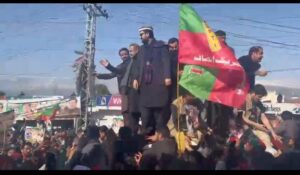Shahenshah Bacha, a voice that once ruled the hearts of Pashto music lovers, now seeks solace in the divine. Once celebrated for his soulful renditions, Bacha has traded the stage for a prayer mat, leaving behind the clamor of fame to embrace the quietude of spirituality.
In the world of showbiz, the transformation of artists is not unheard of. Legends like Junaid Jamshed, Saeed Anwar, and Naimat Sarhadi walked away from their glamorous careers to dedicate themselves to a higher calling. Among these names is Shahenshah Bacha, a name synonymous with the Pashto folk genre. At the peak of his career, he took an unexpected turn—choosing hymns over hits, and seeking a life centered on faith.
Bacha’s journey began in the fertile plains of Pushtun Garhi, Nowshera, in 1970, where he was born into a modest farming family. The only brother to six sisters, he was doted upon, but life demanded pragmatism. After dropping out of school in the seventh grade, he worked alongside his father in the fields before taking up daily wage labor. From loading construction materials onto trucks to honing his skills as a mason, Bacha’s hands bore the calluses of hard work. It was during these formative years that Bacha’s artistic inclinations found an outlet.
The soulful strums of the rabab—a beloved Pashtun instrument—captured his heart, as did the poetic verses of the local Pashto literary circle. Among his influences was the renowned poet and activist Syed Anwar, who recognized the latent artist in Bacha and urged him to sing his poetry. At first, Bacha resisted. His initial recordings were meant for private consumption only—two copies, one for him and one for Anwar. However, a rogue distributor pirated the songs, and they found their way to the masses. His voice, imbued with pain and longing, resonated with the Pashtun diaspora.
Songs from his tapes echoed in bazaars, truck stops, and homes, making him an overnight sensation. Bacha brought a new dimension to tappa, a popular form of Pashto folk poetry, elevating it with his emotive voice and giving anonymity-stricken poets a face. He recorded over 3,000 tapes, including tappas, ghazals, and quatrains, many of which became anthems for his admirers. Yet, fame came with its burdens. Bacha’s conservative father disapproved of his foray into music. “Music may be loved in our culture, but the musician rarely earns respect,” Bacha shared. His father’s disapproval often culminated in estrangement, though familial bonds eventually softened the elder’s stance. Despite his stardom, Bacha’s life remained simple.
He continued working as a mason, taking construction contracts with his partner Subhanullah. His music brought him international recognition, with performances in Afghanistan and beyond. Yet, his roots remained intact, and his earnings were modest. “I sang for my people, not for wealth,” he said. Bacha’s turning point came in 2007 during his pilgrimage to Mecca. “I felt an overwhelming peace during the Hajj,” he recalled. The spiritual awakening deepened upon his return, leading him to gradually distance himself from music. He turned to the recitation of *naats* (poetry in praise of the Prophet Muhammad), producing several tapes that further endeared him to his audience. Stories of his naat khwani (recital) often speak of its transformative power.
One music producer informed Bacha that his recitations had inspired four criminals in Kohat to abandon their lives of crime. This acknowledgment encouraged Bacha to continue on his newfound path. Natural disasters also played a role in reshaping his perspective. The catastrophic 2010 floods swept away what little he had left. Struggling with poverty, he found himself in a relief queue, pleading with God to spare him from such indignities. “I prayed to never have to extend my hand before anyone but my Creator,” he said.
Today, Shahenshah Bacha has built a religious school for girls adjacent to his home. Managed by his daughter-in-law, who is both a hafiza (memorizer of the Quran) and teacher, the seminary imparts Quranic education to local children. Bacha’s son is also a hafiz, carrying forward the family’s spiritual legacy. Bacha’s reflections on his journey are poignant. “In my days of fame, people adored me, showered me with money, and placed me on a pedestal. Yet, I felt hollow and restless,” he said. ” It was only when I turned to my Creator that I found the peace I had been yearning for.” Now, a craftsman by trade and a reciter of devotional poetry by passion, Bacha believes he has finally found his purpose. “There is no greater blessing than earning with honesty and feeding your family with dignity,” he shared, content with his choices.
For those who remember the glory of his voice, Shahenshah Bacha’s transformation is both a tale of loss and redemption—a poignant reminder that sometimes, the greatest conquests lie not in the adulation of the crowd but in the quiet surrender to the divine.
Also Read:












